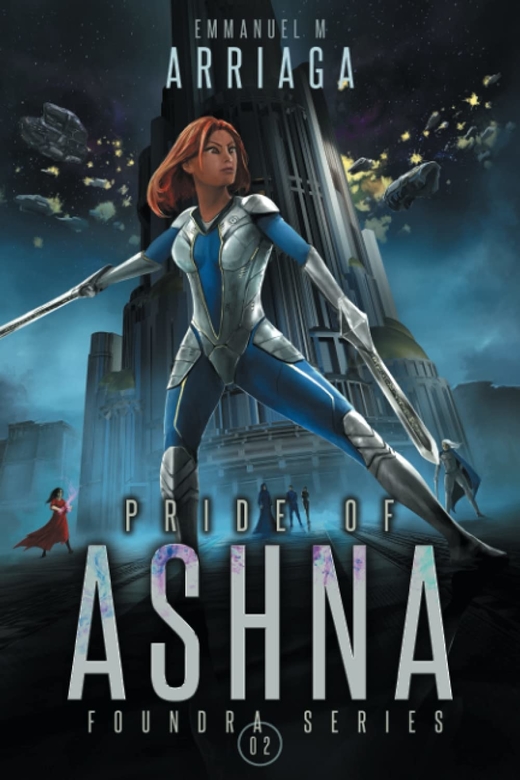The fate of the Huzien Empire is once again threatened by unknown cosmic forces in Pride of Ashna by Emmanuel Arriaga, a jaw-dropping and imaginative sci-fi adventure that expands and improves on the first installment of the Foundra series.
Neven Kenk’s humble heroics continue in this fast-paced sequel, particularly once he discovers that the woman he loves is onboard a pleasure cruise that has been taken over by merciless space pirates in the Outer Rim. A dauntless warrior scarred by the trauma of intense loss as a child, Serah’Elax is a new and incredible protagonist in this female-fronted second installment, seeking justice and redemption with every enemy she eviscerates.
Brime and Soahc, an inconceivably powerful super-couple, bring readers back to the abstract and far-out aspects of this larger story, specifically the mysteries of the Enesmic and the immortal Founders. In that same vein, the Founders Log sections are refreshing breaks in the narrative action, continually expanding the frame and context for this mind-bending future. At a certain point, when a story goes beyond our present reality, sci-fi and fantasy become indistinguishable from the other, and that blending of magic, alien tech, and otherworldly power is the addictive mix Arriaga has achieved here.
The action sequences this time around are even better than the first installment, with fast-paced and well-edited narration that captures both the thrill and deadly nature of high-tech battle. The swirling web of high-stakes plotlines also makes the book difficult to put down, with short, hard-hitting chapters, as well as deep-dive passages of world-expanding exposition. It is easy to get lost in this meticulously mapped galaxy, but the prose also demands an attentive reader, as the writing is heavy with exotic names, places, fictional tech, and alien colloquialisms.
As was the case in the first book of the series, the attention to detail on fantastically advanced tech makes this a comprehensive read, capturing the very best elements of the sci-fi genre. The detailed maps and diagrams at the front of the book set the tone for the scope and scale of this story, and the sprawling universe that Arriaga has created does not disappoint. The level of imagination is astounding, while the speculative fiction aspects make the story relatable for readers today. Arriaga constructs wildly imaginative three-dimensional characters, allowing them to drive the emotion and action of the story, rather than leaning on heavy-handed, omniscient narration. Modern readers may be 80 millennia behind in terms of technology, but the trials and tribulations of love, loyalty, innocence, and trauma are timeless, and carefully examined in this surprisingly thoughtful thriller.
From a technical perspective, the formatting and layout is subtle, but aesthetically unique, making the immersive reading experience even more seamless and transportive. There is occasional anachronistic language that can pull readers out of the illusion, as was also the case in Foundra, and certain dialogic exchanges feel purely functional and inorganic, like the word bubbles in a comic book, rather than conversation in a painstakingly penned novel. An editor with some creative leeway could sharpen these rough edges, and eliminate the repetitive language, as the author does have some overused phrases and favored rhetorical techniques.
That said, Arriaga’s writing is undeniably getting stronger, so hopefully this entrancing universe of dynamic characters and epic stakes is only getting started.
Book Links
STAR RATING
Design
Content
Editing
Get an Editorial Review | Get Amazon Sales & Reviews | Get Edited | Get Beta Readers | Enter the SPR Book Awards | Other Marketing Services
























Leave A Comment